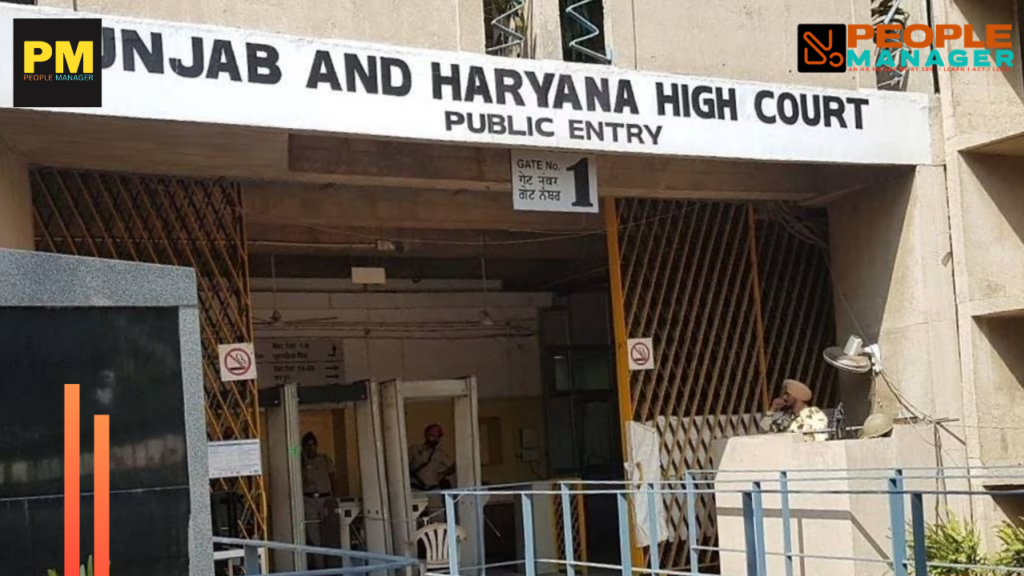Employee Entitled to Continued Salary and Benefits for Acquiring Disability During Service: Punjab and Haryana High Court
The petitioner, Narinder Kaur, an ETT Teacher who joined service at Govt. Primary School Sodhi Nagar, Ferozepur, on September 11, 2016, met with a debilitating accident on March 8, 2017, while en route to school, having been struck by a car. The incident resulted in a severe permanent disability, certified at 90% by the Civil Hospital, Ferozepur, as evidenced by a certificate dated January 22, 2019.

Chandigarh: In a significant judgment delivered on January 30, 2025, the High Court of Punjab and Haryana, presided over by the Honourable Mr. Justice Aman Chaudhary, has upheld the right of an employee who acquires a disability during their service to continued salary and all other admissible benefits. The case, titled Narinder Kaur Versus State of Punjab and others, underscores the statutory obligations of the state towards its employees with disabilities, reinforcing the principles enshrined in the Persons With Disabilities (Equal Opportunities, Protection of Rights and Full Participation) Act, 1995.
The petitioner, Narinder Kaur, an ETT Teacher who joined service at Govt. Primary School Sodhi Nagar, Ferozepur, on September 11, 2016, met with a debilitating accident on March 8, 2017, while en route to school, having been struck by a car. The incident resulted in a severe permanent disability, certified at 90% by the Civil Hospital, Ferozepur, as evidenced by a certificate dated January 22, 2019. Consequently, an FIR No. 42 was registered on April 4, 2017, at Police Station Kulgari, District Ferozepur, concerning the accident, with the trial still pending. Due to the accident and the ensuing disability, Ms. Kaur could not join duty and had been on medical leave without salary since March 8, 2017, which also impeded the clearance of her probation period. Notably, Ms. Kaur is unable to even sign a document, as indicated by the thumb-marked petition.
The crux of the petition filed before the High Court was a prayer for directing the respondents, primarily the State of Punjab and its education department, to release her salary and all other admissible benefits from the date of the accident. The District Education Officer (SS), Ferozepur, had earlier, vide a letter dated December 27, 2021 (Annexure P-5) addressed to the Director Education Department, Punjab, recommended Ms. Kaur’s case for the release of salary, urging its sympathetic consideration. The recommendation highlighted the severe physical condition of Ms. Kaur, stating that her “lower body of employee, legs, arms and hands are not in working condition,” while her “mental condition of the employee is good” and her “financial condition of the house is not good”. The letter further emphasized her bedridden state and complete dependence on family members.
In its response to the writ petition, the State of Punjab, through its written statement, did not controvert the factual position presented by the petitioner regarding the accident and the resultant permanent disability. It was noted that in a previous writ petition filed by Ms. Kaur through her father, Ram Kumar, it had merely been stated that monthly salary was being paid since June 28, 2019, without providing any justification for the delay in commencing the salary payments from the date of the accident.
The High Court’s decision in Narinder Kaur draws significant support and finds strong parallelism with a recent judgment by a Coordinate Bench in Amit Kumar vs. State of Haryana and others (CWP-21761-2022), decided on March 6, 2024. In the Amit Kumar case, an employee working as a Multi-Purpose Health Worker since June 28, 2019, suffered a severe head injury in a road accident on December 31, 2020, leading to a state of coma and 100% disability. Despite the employee being declared fully disabled based on a medical report dated July 11, 2022 (Annexure A-3), his salary had not been released since January 2021. The only justification provided by the respondents in that case was that the matter was pending consideration for the creation of a supernumerary post to facilitate salary release.
The Honourable Mr. Justice Aman Chaudhary, while adjudicating Narinder Kaur‘s case, noted that the facts were akin to those in Amit Kumar, against which no Letters Patent Appeal (LPA) was filed, thereby lending significant persuasive weight to the precedent. The court, echoing the sentiments expressed in the Amit Kumar judgment, emphasized the employer’s duty to be sensitive to the plight of an employee who unfortunately meets with an accident and suffers a disability during service. It was observed that an employee in such a vulnerable state should not be compelled to approach the court to claim what is rightfully theirs under the law, especially when the State is expected to act as a welfare entity.
The judgment in Amit Kumar extensively relied upon Section 47 of the Persons With Disabilities (Equal Opportunities, Protection of Rights and Full Participation) Act, 1995. This crucial provision mandates non-discrimination in government employment concerning employees who acquire a disability during their service. Specifically, it stipulates that no establishment shall dispense with, or reduce in rank, an employee who acquires a disability during their service. The proviso to this sub-section allows for the shifting of the employee to another post with the same pay scale and service benefits if they are no longer suitable for their original post due to the disability. Furthermore, if adjusting the employee against any suitable post is not feasible, they may be kept on a supernumerary post until they attain the age of superannuation, whichever is earlier.
Based on the provisions of Section 47 of the 1995 Act, the Coordinate Bench in Amit Kumar held that the respondents should have granted the benefit of salary to the disabled employee who had been in a coma for over three years. The court found no impediment on record that justified the non-release of salary, lamenting that the family was forced to seek judicial intervention for this essential relief. Consequently, the writ petition in Amit Kumar was allowed, with a direction to the respondents to release all arrears of salary from January 1, 2021, within a period of two weeks, along with all consequential benefits.
Applying the same legal principles and the precedent set in Amit Kumar, the High Court in Narinder Kaur‘s case similarly found no justifiable reason for withholding her salary since the date of the accident on March 8, 2017, which resulted in a 90% permanent disability during her service. The court noted that the State counsel could not controvert the factual aspects of the case.
Drawing strength from the Coordinate Bench’s decision, the Honourable Mr. Justice Aman Chaudhary directed the respondents in Narinder Kaur‘s case to pay salary and all other admissible benefits to the petitioner from the date she met with the accident on March 8, 2017, considering the precedent of Amit Kumar.
Furthermore, aligning with the directions issued in Amit Kumar, the court also addressed the aspect of interest on the delayed payments. Relying on the judgment of the Coordinate Bench in J.S. Cheema Vs. State of Haryana, 2014(13) RCR (Civil) 355, the court reiterated the jurisprudential basis for granting interest, which is that one person’s money has been used by somebody else, making it akin to rent for the usage of money. The court held that even in the absence of negligence on the part of the State, if money rightfully belonging to the employee was in the custody of the State, the employee would be entitled to interest. Consequently, the arrears of salary in Amit Kumar‘s case were directed to carry an interest of 6% per annum from December 31, 2000. Applying this principle to Narinder Kaur‘s case, it is implied that the arrears of her salary would also accrue interest, although the specific rate was not explicitly mentioned in the excerpts provided for this case.
In a significant move to ensure timely future payments, the court in Amit Kumar had also directed the respondents to release the salary to the petitioner by the 7th of every month until he is alive or attains the age of superannuation, whichever is earlier. Additionally, recognizing that Mr. Kumar was in a coma, the bank authorities were directed to release the salary received in his account to his family members for his care during his ailing days. While similar specific directions for monthly salary release and bank procedures are not explicitly stated in the provided excerpts for Narinder Kaur‘s case, the overarching principle of continued salary and benefits from the date of disability acquisition remains firmly established.
The court further imposed a cost of ₹25,000/- on the Department in Amit Kumar‘s case, noting that the salary of a disabled employee was withheld without any valid justification, compelling the employee’s family to approach the court for their rightful claim. This cost was to be paid while complying with the directions given by the court. The court also issued a stern warning that non-compliance with the issued directions within the stipulated timeframe would be viewed seriously, potentially leading to the initiation of contempt proceedings against the responsible parties. While the imposition of costs is mentioned in the context of Amit Kumar, it is not explicitly stated whether similar costs were imposed in Narinder Kaur‘s case based on the provided excerpts.
Implications of the Judgment
This judgment in Narinder Kaur, heavily relying on the precedent set in Amit Kumar and the statutory provisions of the Persons With Disabilities Act, 1995, serves as a significant affirmation of the rights of government employees who acquire disabilities during their service in the states of Punjab and Haryana. It unequivocally establishes the principle that such employees are entitled to continued salary and benefits from the date of acquiring the disability.
Key highlights from the judgment include:
Statutory Right to Continued Benefits: The judgment reinforces that Section 47 of the Persons With Disabilities Act, 1995, creates a clear legal obligation on the employer to ensure that employees who acquire disabilities during service are not disadvantaged in terms of pay and service benefits.
- Duty of the State as a Welfare Entity: The court emphasizes the State’s responsibility to act sensitively towards its disabled employees and to proactively ensure their entitlements are met without unnecessary litigation.
- Precedence and Consistency: The reliance on the Amit Kumar judgment highlights the importance of judicial consistency and the application of established legal principles in similar factual scenarios.
- Financial Security for Disabled Employees: The judgment underscores the need to provide financial security to employees who are rendered unable to work due to disabilities acquired during their service, ensuring their and their families’ well-being.
- Timely Release of Entitlements: The direction for the release of arrears with interest and the emphasis on timely future salary payments highlight the court’s commitment to ensuring that disabled employees receive their due benefits without undue delay.
In conclusion, the judgment in Narinder Kaur Versus State of Punjab and others stands as a crucial pronouncement safeguarding the rights and financial security of government employees in Punjab and Haryana who unfortunately acquire disabilities while serving. It reiterates the State’s obligation to uphold the principles of non-discrimination and to provide continued support to its employees in times of adversity, in accordance with the Persons With Disabilities Act, 1995. For further insights into the evolving workplace paradigm, visit
- SHe-Box Portal Pushes Companies to Take Workplace Harassment Complaints Seriously: 2025 Report - February 16, 2026
- India’s Labour Codes Are Redrawing the Hiring Map- Tier III & IV Cities Emerge as the New Growth Engines: Report - February 11, 2026
- Girish Ramadurgam on Talent-Fitment” Problem: How to resolve the skill mismatch - January 19, 2026









दिव्यांग कर्मचारियों से संबंधित जानकारी बहुत ही ज्ञानवर्धक और जनहित में है।
धन्यवाद